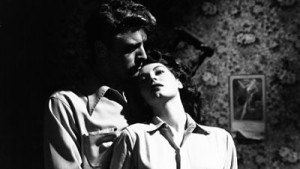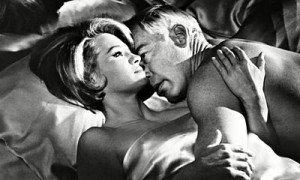STUDIO: Criterion | DIRECTORS: Robert Siodmak, Don Siegel | CAST: Burt Lancaster, Ava Gardner, Edmond O’Brien, Lee Marvin, John Cassavetes, Angie Dickinson, Ronald Reagan
RELEASE DATE: 7/7/15 | PRICE: DVD $29.95, Blu-ray $39.95
BONUSES: Interview with historian Stuart Kaminsky, recording of Stacy Keach reading Hemingway’s short story, 1949 radio adaptation of the Siodmak film, audio excerpt from Don Siegel’s autobiography, interview with Clu Gulager, Andrei Tarkovsky’s 1956 short film based on the Hemingway story, new essays by Jonathan Lethem and Geoffrey O’Brien
SPECS: NR | 196 min. | Crime | 1.33:1 fullscreen | mono
“I did something wrong, once…”
Ernest Hemingway might have been too esteemed in literary circles to be labelled a “hardboiled” writer, but his short story The Killers is most certainly a landmark in crime fiction. The story has remained a staple in the noir canon and is expertly put into context in this two-disc set (originally released in 2003, and now reissued on DVD and Blu-ray) that features several adaptations of the tale.
The package spotlights Robert Siodmak’s (The Dark Mirror) superbly noir 1946 adaptation and Don Siegel’s (Private Hell 36) explosive 1964 reworking of the tale. Siodmak’s film recreates Hemingway’s original story in its first 12 minutes: two killers enter a local diner and await their prey, who never shows up; a customer from the diner goes to the apartment of the intended victim, ex-boxer Ole Anderson (Sweet Smell of Success‘s Burt Lancaster, making his movie debut) to warn him. Anderson won’t leave the room, as he is perfectly reconciled to his impending death (his only explanation as to why he’s a marked man is the quote given at the opening of this review).
Screenwriter Anthony Veiller (and the uncredited John Huston and Richard Brooks) did a brilliant job transforming Hemingway’s to-the-point story into a feature film. The vehicle to provide the back story leading up to (and beyond) the killing is an IRS investigator (Edmond O’Brien, The Hitch-Hiker), who wants to know why Anderson didn’t flee the hit men. What he discovers is a tangled tale of a heist and (naturally) a femme fatale (the devastating Ava Gardner, in her breakthrough role) conveyed through a series of flashbacks.
Siodmak’s film is thus a thriller told backward (take that, Memento!), which explains the “why” rather than the “what” aspect of the situation (thankfully Universal didn’t demand a happy end that would have negated the details of Anderson’s sad, existential death). Siodmak is well known to noir fans, but this Criterion release reminds all of us just how beautifully dark his images could be. His Killers, although bumpy on the narrative level, is a visual masterpiece.
Don Siegel’s film has some terrific scenes, but it is quite uneven and operates on several different “registers.” Siegel stipulated that his screenwriter, Gene L. Coon (TV’s original Star Trek), should not adapt the Hemingway story and so Coon appears to have taken Veiller’s original script and shifted around the location, the profession of the victim (here he’s a race-car driver, not a boxer) and a few key motivations.
The main change in the Siegel version is that the two killers (The Commancheros‘ Lee Marvin and Clu Gulagher) are the ones who want to know why their target didn’t run. What they discover is basically the same set-up found in Veiller’s script: a gullible but passionate gent (John Cassavetes, Rosemary’s Baby) falls for a femme fatale (Angie Dickinson, Dressed to Kill), whose involvement with the crook masterminding a caper means she will inevitably betray our anti-hero.
The most striking thing about Siegel’s film is the wild clash of acting styles. Lee Marvin does an excellent job as “the older killer” (a clear precursor to his role in Point Blank), the character who gets to utter the film’s best line (“The only man that’s not afraid to die is the man that’s dead already….”). His matter-of-fact performance seems light years away from Casavetes’ more unbridled (and, yes, occasionally hammy) “method”-ish turn as the passionate racer.
The most jarring performance is given by the actor playing the chief crook — a certain Ronald Reagan, appearing in his last-ever film role, playing his only major part as a “heel.”
Siegel’s Killers was originally produced as a TV movie but rejected by NBC because of its brutal violence (the fact that the Kennedy assassination occurred during the film’s production most definitely contributed to this decision). The fact that Siegel got Reagan to play a sleazy crook is nothing short of amazing. On the one hand, Reagan is perfect in the role — his hair perfectly coiffed, his demeanor uncaring, his reading of the dialogue flippant (his delivery of the endearment “baby” to Dickinson makes him sound like an evil twin to Fred MacMurray’s Walter Neff in Double Indemnity).
On the other hand, since Marvin and (especially) Cassavetes were such inventive, intrepid performers, it’s fascinating to contrast their acting styles to that of Reagan, whose most adventurous move is to arch an eyebrow when he’s trying to be menacing.
The supplements in the package illuminate both films and the original Hemingway story. An on-camera interview with mystery novelist Stuart Kaminsky reveals that Siegel was asked to direct the ’46 film by producer Mark Hellinger, but the deal fell through. Kaminsky also, interestingly, finds the ’64 film to have a more satisfactory scenario because one character does undergo a change as the film proceeds (Marvin’s killer) whereas, he says, no one changes in the Siodmak version.
A segment from Siegel’s autobiography read by actor Hampton Fancher includes much information on the state of Marvin’s sobriety during the shooting — he was in fact drunk throughout the production, and the one time that Siegel offered to let him drink real booze on-camera, on a shooting day before the Xmas break, Marvin refused to do so.
In an extremely sincere and informal interview (shot by his sons), Clu Gulager supplies more info on Marvin, saying that he liked provoke his fellow actors by changing his delivery of lines from take to take to see what they would do in response.
A 1949 radio adaptation of the Siodmak film (from Screen Directors’ Playhouse) is also included. The best audio offering, though, is Stacy Keach (End of the Road) reading the original story (from an audio book of Hemingway’s short works). Viewers who intend to take in the whole package might do best to start with the Keach reading, since it fully contextualizes what the filmmakers did to extend the original tale.
The most intriguing inclusion is a 1956 student film adaptation of the story by Andrei Tarkovsky (Solaris) and two of his classmates. The short is a perfect film-school exercise: a scenario with only two sets, requiring a limited amount of cast members and allowing for various experiments in camerawork and editing to induce suspense.
The film has none of the gorgeously fluid camerawork or deliberate pacing of Tarkovsky’s later masterworks, but it contains enough ingenuity to spotlight both the incipient talent of its three directors and to show the cross-cultural power of Hemingway’s tale of a condemned man who refused to run away from death.
|
Buy or Rent The Killers
|
|||
|---|---|---|---|
 |
|||


Leave a Reply